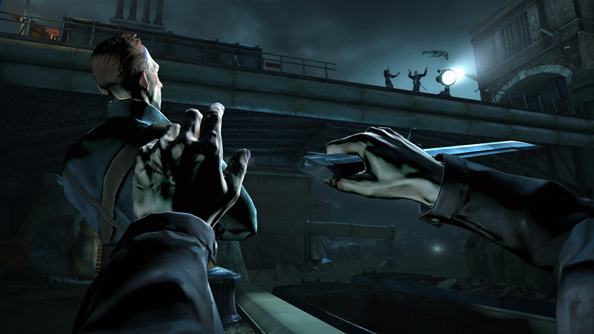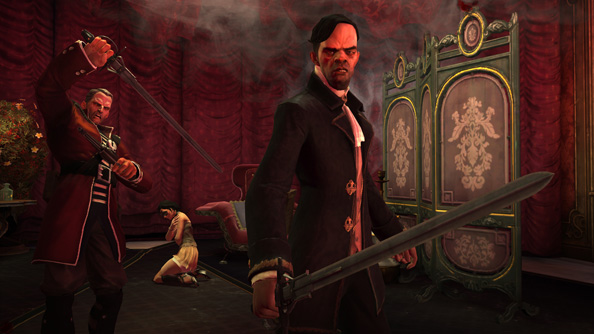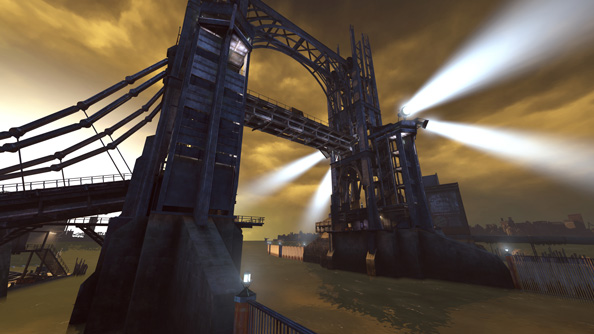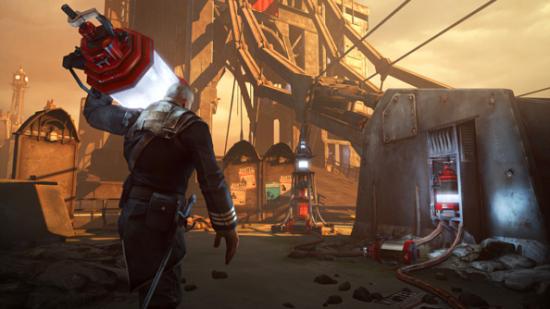Dishonored launches on Friday in Europe and tomorrow in North America. It’s a videogame all about what it might be like if Derren Brown went mad one day and decided to murder government officials using his eerie supernatural powers. We’ve all been playing Dishonored, here at the big lighthouse in which the PCGamesN crew live and have adventures together, and now we’re ready to discuss precisely what we think about it. Chairing this meeting of opinion, and steering the good ship discourse, is PCGN editor Tim Edwards — here’s what we thought of Dishonouuured.
Tim: So we can get a bit of understanding of what you like. Place these games in order of goodness: Thief 1 and/or 2, Bioshock, Deus Ex, Call of Duty, Peggle. The reason I’m asking is because I want to understand how you feel about the kind of game Dishonored is: a shooter/RPG/sim thing.
Jeremy Peel: Thief 2, Deus Ex, Thief 1, Bioshock, Peggle, Call of Duty. I’m one of those people who bandies about the term ‘immersive sim’ a lot, for lack of something more dynamic. To say that these are the games I live for wouldn’t be a stab too far south of the jugular.
Steve Hogarty: In order of goodness? Peggle, Deus Ex, Thief, Bioshock, Call of Duty. But it’s an apples and oranges thing. I would put ‘chips’ halfway up that list, because I like chips a lot. I enjoy shooty Call of Duty in a different way to how I enjoy sandboxy Deus Ex, which is what Dishonored really is, but I’m a fan of both sorts of game. Most, I am a fan of Peggle.
Paul Dean: Deus Ex, the Thief games, Peggle, Bioshock, Call of Duty. I want to make it clear that I like Peggle and that it marks a boundary. The games that fall behind it are those I have much more middling feelings towards. I found Bioshock very linear and claustrophobic in all the wrong ways and, in Dishonored’s early introductory levels I had a horrible fear I was going to be playing that game again. Fortunately, that didn’t happen.
Tim: So, you’ve just started up. Did you go into the game with a specific playstyle or build in mind?
Jeremy: Full disclosure – in real life, I’ve never killed anybody. Not even a baddy. If an action game gives me a nice person option – at least, within the logic of gaming whereby regular GBH and blackmail has you pegged as a soft touch – I’m going to do my very best to take it at every possible juncture. Dishonored purportedly allows for this at every possible juncture, so I set out with the aim of a clean blade at the finish line. I’ve already buggered it up, mind. I had a bit of an accident with a bomb.
Steve: Murder-stealth. I don’t think gung-ho is an option Dishonored ever places on the table, but I planned on dropping off loads of ledges and stabbing lots of guys in the neck as I hit the floor (which you can do from any height, as knives negate fall damage). I didn’t shy away from killing every guard I crossed before the game started telling me off in the loading screens, finger-wagging and warning that too many deaths caused more rat swarms to appear, the city to become “darker” and my allies to respond to me differently.
So I began subduing them instead, using that magical sleep-grip all assassins seem to learn on day one of assassin school. It’s practically identical to killing them — and not once did another guard wake up an unconscious victim, I’m not sure they can — except Corvo gets to keep a clear conscience. You can go through the entire game, *party popper*, without killing anybody. Sadly however, you can’t carry out non-lethal takedowns when dropping from ledges.
Paul: We had a chat about the different ways that we could play and I went into this determined to explore and interact as much as possible. I wanted to see how many different routes I could take through a map, how many different people I could talk to and how much I could make use of my wits or my wiles to talk (or wriggle) my way out of problems. I wanted to manipulate.
As soon as I could, I was leaping and Blinking all over the place, jumping up onto roofs, investigating open windows, lifting keys from hooks, reading codes from documents and rummaging around in every bin that I could. I sort of became a magical, flying hobo, desperately trying to convince everyone to help me out, man, just to pay day, and thieving them the moment they turned their backs. I also wanted to be evasive, picking pockets and melting into the shadows. If I had to fight, I tried to minimise casualties.
Tim: Tell me about the first level. What’s the goal, what’s the setting. What do you have to do?
Steve: The first mission proper, following the game’s plotty prologue in which you’re framed for the murder of the Empress, is to pop into Dunwall to assassinate the freshly appointed High Overseer Campbell. Like all the bad guys in Dishonored he looks like Ben Kingsley and has taken up residency behind an insta-killing Wall of Light. You arrive by boat to this hub area, which is peppered with side-missions and distractions, most notably those of the Susan Sarandon-voiced Granny Rags, a haggard, demented old dame smeared in mascara and blusher.
Paul: And that hub area also forms the basis of part of the next mission… but I’m getting ahead of myself. Yes, you’re nominally supposed to kill Campbell, but apparently it’s possible to not do this and, even if you do go through with the deed, there’s a number of ways to do this which can result in what I’m guessing is at least three different outcomes. I don’t want to spoil this for new players and I’ve yet to see how far the different chains of consequence rattle their way through the game’s plot, but let’s just say I was met with an interesting choice when I thought I was about to do the deed.
The level, by the way, like many, feels oddly similar to City 17, an uncomfortable meeting of different technologies. I’m not sure how much my actions in the first mission affected the layout of the second mission, as some things had certainly changed when I came back. I’m pretty sure I had people waiting for me and that things had got measurably nastier.
Tim: And how did you do it?
Steve: My answer contains first mission spoilers, since you asked for them. This early in the game, Dishonored gleefully points out all the routes you might take past the Wall of Light: either disable it by pulling out its whale oil canister (Dishonored’s ubiquitous power source), possess a rat to scurry through a convenient rat-hole, or climb around it through back alleys. I did the latter, and from there — well, there are so many branching options and means of navigating Dunwall that it would be tedious to list them all. There are bystanders to rescue, poisoned chalices to swap and prisoners to release. You eventually reach the High Overseer’s office, but not before overhearing guards discussing something called the Heretic’s Brand, a metal torture device that permanently sears a mark onto the foreheads of shamed and banished Overseers.
This is the nonlethal means of eliminating your target, every mission has one, and they’re uniformly more interesting than simply running your mark through with a blade. Disabling Campbell from behind, I carried his unconscious body to the interrogation room, found the Heretic Brandand branded him a heretic. I left him lying there in that seat, making my escape, confident that the laws of the land would see him evicted from his position, ostracised by his peers and excommunicated by Dunwall. Which he was. Hooray.
There’s so much more flavour to that mission than I’ve just described however. So many more variables and consequences and characters and sneaking.
Paul: I immediately wandered off and began picking tins of fish out of the rubbish and trying to prise them open with my grubby fingers and then poking those same grubby fingers into the business of the other people who were hanging around nearby. I also tried to absorb all the information I could from eavesdropping and rifling through documents. After learning that the fanatical Overseers and the more conventional city watch did not always get along, I discovered that the High Overseer planned to kill one of the senior members in the city watch and that he wanted to do it that very evening. I thought it would be interesting to capitalise on this power play.
By the end of the night, I made sure the High Overseer had poisoned himself, Princess Bride-style. This resulted in the watch commander falling under suspicion and, I’m sure, brought about a great division among the city’s security forces. That, I hope, can only help to foment revolution and regime change and it didn’t directly implicate the movement I was working for. It was certainly poetic, too.
Tim: One of the later trailers showed some of the more show-offy ways you could combine your abilities: attaching bombs to rats; things like that. Did you find yourself in any situations where you thought “if I combine this, with this, I’ll get….”
Jeremy: I don’t know whether a lack of imagination’s to blame or I’m simply not engineering situations to my advantage properly, but thus far I’ve not had any inspired toaster-and-duct tape moments. Moment-to-moment, though, that design philosophy is apparent in all of the abilities I’ve encountered so far.
Blink, the short-range teleport tool, is the example to use if you’re asked about this at dinner parties. First, it’s a platform-hopping novelty. Then it becomes an exploration-enabling grappling hook, a last minute reprieve before a long fall and, thanks to a smart stealth system which sees line-of-sight become more important than staying in shadow, a means of travelling from one point of cover to the next. The net result is that it extends your reach, in every way you can think of.
That’s because a hundred playtesters have thought of it before you, and Arkane have gone in after them to support all of the options. For the same reason, it’s limited in all of the right ways – the mana system makes it impossible to speed-blink your way to the level’s target, but leaves you with enough juice that exploration is always possible.
Like the Gravity Gun, Blinking is going to ruin every other first-person game you’ll play for the rest of your life. I made the mistake of leaving the house after a session yesterday, and discovered the same was true there. ‘If I just hopped up onto that drainpipe, I could crawl through that bedroom window…’ Dishonored has turned me into a real life predator.
Steve: You really have to seek out opportunities to be as creative with your powers as Arkane are in their trailers. Dishonored can be finished using only the Blink ability and your sword andsimple executions are, in the 12 hours I’ve played, always the most efficient ways of taking out targets. Either that, or you’ll be outright avoiding combat, which is the direction the game seems to nudge you towards wherever possible. So I’ll be saving most of my combinatorial antics for a second playthrough, I think.
That said, I did have a tiny smidge of ’emergent gameplay’ when I froze time, plucked a guard’s crossbow bolt out of the air and fired it back at him before unfreezing time and allowing the freshly rearranged scene to play out. Most of what Arkane showed in their trailers is difficult to achieve, but incredibly satisfying to pull off. Freezing time in the fraction of a moment after a shot’s been fired, possessing the guard who fired the shot and walking him in front of his own bullet is probably the most fun method of killing an enemy in any game I’ve played. It’s tricky, but so worthwhile. If you play Dishonored with the intent of killing nobody and leaving nothing but footprints, you’ll miss the entire point of the thing. It’s so strange and schizophrenic that your ‘score’ is increased through absolute stealth rather than creative kills – maybe Arkane should’ve taken a leaf out of Bulletstorm’s book here, The Big Book of Sage Appreciation of Your Clever Murders.
Paul: Yes, in reality, the mechanics of trying to select and combine a couple of different powers is a bit more difficult than I first thought, but it can be done. I discovered that, because Blinking tends to confuse people, that even fully-alert guards could be quietly choked into unconsciousness if you had enough mana to first slow time and then blink behind them. The speed at which you did this put them off enough to allow you to overpower them and was a good way to defuse a potentially deadly situation. Playing on Hard, I found that alerted guards made a lot of noise and tended to bring all their friends to the party very quickly. That second or two that you had to slow time and to Blink behind someone was often a lifesaver.
Tim: How did it run on your PC?
Jeremy: I’ve tested Dishonored on a grand total of one machines, but its performance there leads me to believe that beauty is a scaleable thing. It ran like a hare on a budget laptop – the Acer Aspire 5750 – and I can’t for the life of me see where the cutbacks have been made.
That’s partly testament to the art direction, which for once drives the way tech is used, rather than the other way around. There’s no notable use of normal mappings, specular lighting, or any other Carmack-isms you could name – actually, you’ll notice some crap flat textures used for piles of dirt and the like. But it really doesn’t matter, because all the important stuff is forefronted. You’ll gasp the first time you see a watercolour whaler’s boat coming into port, whatever your rig’s like.
Steve: I’ve got a Core i7 920, 6gb memory and a 1gb Radeon 5700. Dishonored ran just fine on maximum settings, with a couple of seconds of apologetic chugging after loading. The art style is beautiful, painterly and watercoloured, but technically there doesn’t seem to be a whole lot of fancy graphical magic going on under the bonnet. That’s not to say Dishonored isn’t pretty. It’s ‘Source Engine’ sleek rather than ‘Unreal Engine’ glossy. Does that make sense? Probably not. Especially as it’s running in Unreal Engine 3. Shush, it looks nice and runs well.
Paul: I don’t have a machine that’s quite so sexy, but I never had a single performance problem. With a 1Gb GTX 460 alongside 4Gb of RAM and a dual-core 3Ghz AMD I was able to ramp every setting up to maximum and the game hardly ever dropped below 50fps. The Source Engine is exactly what Dishonored reminded me of, actually, and I think some PC gamers are going to say it already looks a few years old. It’s won’t tax even mid-range graphics cards and though there’s nevertheless some cute environmental effects, there’s also one or two horrors, such as, yes, the occasional particularly ugly texture or low-resolution shadow. Still, it doesn’t feel like the levels are cramped or that Arkane had to cut back their vision of Dunwall’s scale and dirty beauty.
Tim: Did you run into any bugs or weird glitches? Anything that irritated you about the game’s controls or technology?
Jeremy: This is a trick question, isn’t it? It’s Empire: Total War syndrome. I’m going to say no, and then tomorrow it’ll transpire that there’s a black hole that gobbles up all of your system files in the penultimate level.
Honestly though, the whole shebang’s as polished as a Buckingham Palace toilet and goes just as deep. There’s a peculiar mindset that those of us who’ve played ambitious Western RPG-alikes since the ‘90s are used to donning, silently, in which we mentally recite something like this: I will suffer the most exquisite design tortures and near-game breaking bugs to live in a world that rings true.
Dishonored goes as deep as anything from Ion Storm or Obsidian, and it won’t make you suffer for the privilege. Maybe that shouldn’t be the special and rare thing that it is. But it’s worth noting, especially as struggling through Arkane’s last released game – the Looking Glass/Valve mashup Dark Messiah of Might and Magic – necessitated a very strong ‘90s mindset indeed.
Steve: Mouse smoothing is on by default. You have to turn it off in a menu. And one time I tried to climb out of a sewer and a woman started talking to me through a wall. That is all.
Paul: Because I had subtitles on, I found that I was frequently overhearing people who were nowhere near me, sometimes through walls. I also sometimes saw shadows through walls including, at one point, the shadow of a giant hound, which was terrifying enough that I thought it was deliberate and perhaps supposed to be a ghost. I do wish I could’ve configured the mouse to be a bit more sensitive and, as we’re all too used to, there were occasional clipping problems with models and scenery.
Also, I noticed that guards that I’d rendered unconscious would often disappear, sometimes very quickly. I laid down one sleeping sentry by a doorway, popped in to pick up an item, and then found he’d already vanished when I stepped out again, though I’d been only two meters away. And no, he definitely wasn’t nibbled away by rats.
Tim: Some are calling this the game of the year. Do you agree?
Jeremy: We certainly haven’t seen its like anywhere else this year, and there’s not much else similar in recent memory. It’s a close relative of Deus Ex: Human Revolution, and it shares blood – and ex-Looking Glass staff – with Skyrim, looked at in a certain light.
Dishonored is loads of fun, no doubt about that. It’s a compelling tale not of good and evil, but of order and chaos – one in which nobody’s really that keen on the chaos, but everybody has a different idea about what sort of order it calls for. It’s a license to explore Dunwall, the most human gameworld in a very long time – both in its majesty and the horrible, unspeakable things you’ll do and see done to its people. Best, it’s at least as good as providing tools for emergent play as Deus Ex or Thief. So yeah, go on then. Game of the year.
Steve: Well no, the year isn’t over and the rest of its biggest games haven’t come out yet. Who’s saying that? Silly people. Dishonored is excellent, sure. As Jeremy says, it’s genetically twinned with Human Revolution, though both games excel at different things. Weirdly, I thought I’d instantly fall in love with Dunwall as a location, but the over-reliance on endless piles of books to flesh out the Orwellian alternate-Empire capitalquickly became tiring. Visually it’s an awe-inspiring place, hands down beating Deus Ex for its perfectly composed vistas and dominating towers, but there’s little living substance behind it, Dunwall is dull to explore and what sparse texture there is Arkane deliver in a tell-don’t-show manner. It feels like most of what makes Dunwall appealing is still tied up in the heads of concept artists and writers. Human Revolution has the more convincing locations, easily.
But Dishonored has the better murders and the better set-pieces, its missions feel like hermetically sealed sandbox chambers, its rooms are surgically designed to appear impenetrable when in fact they’re built like swiss cheese. Your supernatural powers strike a balance between making you feel godlike, while their limitations make you feel clever and skillful. It feels every bit an old-school PC game, a cousin of Thief, BioShock and Deus Ex. I don’t think any other first person shooter(ish) game this year will feel like it. I don’t think anything will feel like it until BioShock Infinite comes along. So it’s thatgame of year. Just not thegame of the year.
Paul: Umpf, I don’t know. Dishonored has surprised me in many ways, most of them good, but not all of them. I think, from an art, design and storytelling point of view, it’s a triumph. It creates a lovely world for you to play in and populates it with all sorts of interesting stories and ideas. I also like how challenging it feels on the Hard difficulty level, because you really don’t want to mess up and, if you do, you have to frantically improvise your way out of trouble as guards call to each other, sound the alarms and release their hounds.
I don’t know how much it’s really pushing boundaries, though. I feel a bit like I’m playing Invisible War, or perhaps even the original Deus Ex, but with more ways to kill people rather than more ways to solve problems. Though that’s not at all a bad thing, I suppose I was hoping for more choices, more plot branches or more ways to interact with the world. Steve’s absolutely right that there’s a lot of holes that let you scurry your way into the swiss cheese and I’m not sure character development is exclusive enough to prevent you from always having many different ways to solve a problem. I guess that’s good, right? But I do get the feeling that, by the end of Dishonored, whatever direction you developed your Corvo in, you’ll still end up being good at most or all of the things that the game offers.
That said, I’ve played for about seventeen hours so far, way more than the quoted minimum completion time, and I’m only four missions in. I’ve tried all sorts of different things and still have plot threads and possibilities that I haven’t yet had time to investigate. I’ve been killed dozens of times. I’ve talked to everyone that I can, for as long as I can. I’ve spent hours exploring and still come up short on every level. I’ve had characters react intelligently to certain choices I’ve made and I’ve wondered quite how differently they might behave if I did something very different next time. I’ve toyed with the idea of putting an end to Granny Rags, simply to see what consequences this has. Really, I’d want to thoroughly play through Dishonored at least twice before I decided just how smart it really is.
I do feel that it’s a very good game and that itself is nothing to be sniffed at. It’s original in its setting, frequently fascinating and, even if it’s mechanics don’t do much more than those of the now 12-year-old Deus Ex, that it even employs those mechanics to the extent that it does makes me a happy person. Dishonored might not end up being the game of the year, but it will still be one of the best and it is a very, very enjoyable experience.
You’re reading theDishonored channel at PCGamesN.Checkprices for Dishonored download with our retail partnerGreen Man Gaming and follow our Dishonored Twitter account for updates.
